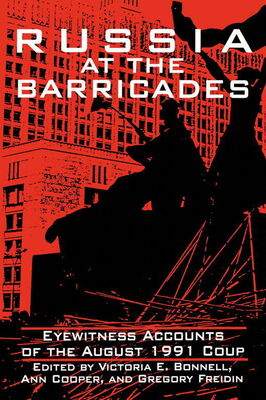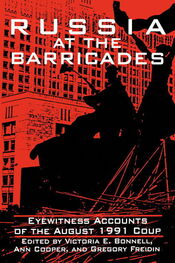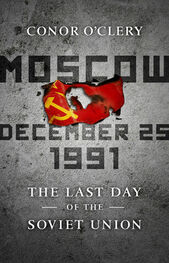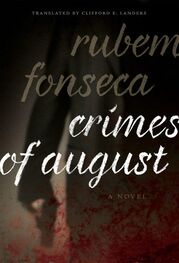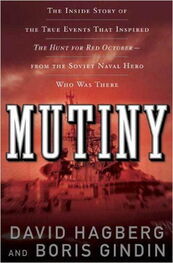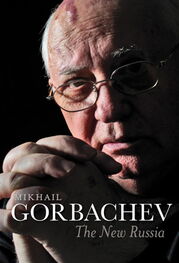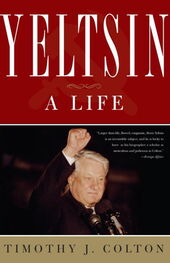On March 17, 1991, a nationwide referendum was held on the future of the Union. The majority of citizens voted for the preservation of the USSR.
“War of laws” is the phrase used to characterize the jurisdictional disputes that followed upon unilateral declarations by some republics and even lower political units that in the event of a conflict between Union legislation and local law, the latter should prevail.
This was a double entendre question, referring not only to the alleged illness of Gorbachev, but also to the answer Yanaev gave when he was asked about his health at the USSR Supreme Soviet at the time he was being considered for the post of Vice President. “My health is all right,” he responded, “My wife ain’t complaining.”
The National Salvation Committee of Lithuania was a shadow organization in whose name die-hard Communists, aided by the Soviet Army, were planning to take over Lithuania in January 1991.
Reference is to the abrupt removal of Soviet leader Nikita Khrushchev from power in 1964.
A military junta led by General Augusto Pinochet overthrew Chilean President Salvador Allendein 1973.
Earlier in the summer of 1991, Russian President Boris Yeltsin had issued a decree prohibiting all political parties, including the Communist Party, from locating their chapters at workplaces anywhere on the territory of the Russian Federation.
According to Yanaev’s statement at the press conference, the state of emergency was to be introduced in Moscow on August 19.
The order to withdraw was issued by Yazov on the morning of August 21.
This is a reference to the toppling of the statue of Feliks Dzerzhinskii, founder of the secret police, on Thursday evening.
As a rule, military enterprises were referred to by post office addresses.
This building, the Moscow headquarters of the Council for Mutual Economic Assistance (Russian acronym SEV), would later house the Moscow mayoralty offices.
According to S. Alekseev, the head of the committee, the version of the report as it appeared in Izvestiia had been heavily amended by the censor.
Memorial is a voluntary association dedicated to the history and rehabilitation of the victims of repression.
This was a grassroots, Gorbachev-encouraged democratic movement of the early years of perestroika.
That is, among the prospective cosigners of the Union Treaty.
That is, in the old Union government.
The leaders of, respectively, Kazakhstan, Ukraine, Belarus, and Uzbekistan.
Gorbachev is echoing comedian Gennadii Khazanov’s memorable quip, “These guys of ours, they can’t even stage a putsch correctly.”
Kriuchkov never came.
The Interregional Group, made up of about two hundred liberal-minded deputies, formed after the first free elections of the new USSR Congress of People’s Deputies in 1989. The group was originally headed by Sakharov and Yeltsin.
According to the Russian Information Agency, both Isakov and Isaev voted against Khasbulatov’s motion. The person who abstained was Yurii Voronin, the head of the Parliamentary Committee on Budget, Taxes, and Prices. See Putch: Khronika trevoznykh dnei , with an introduction by A. Vinogradov and G. Pavlikovskii (Moscow: Progress, 1991), p. 59.
Chairman of the Russian Supreme Soviet’s Committee for Economic Reform and member of the Presidium of the Supreme Soviet.
The text of the appeals was published the following day, August 20, in Izvestiia .
Bragin was subsequently appointed head of the State Committee for Television and Radio Broadcasting (formerly Gosteleradio).
Shcherbakov is referring here to the fact that both he and Doguzhiev were first deputy prime ministers and that either might have replaced Pavlov.
General M. A. Moiseev, the Chief of the General Staff, was retired from the service two days after the end of the putsch.
General Makashev was known for his right-wing views and his association with the putschists.
The heads of the nine republics that had agreed to the Union Treaty, plus the USSR President, Gorbachev.
Khudonazarov comes from Gornyi Badakhshan, a region of the Tajik Republic that is high in the Pamir Mountains, close to Afghanistan.
Khudonazarov was an unsuccessful candidate for president of Tajikistan.
This is a reference to the proposed change in the name of the country to the “Union of Sovereign Republics.”
Otto Latsis, a liberal reformer and an editor of the journal Kommunist .
Colonel General Kobets was Russia’s Chief Military Liaison with the Union Defense Ministry.
Many members of the USSR Supreme Soviet who were not permanent residents of Moscow had special apartments in the capital for official use.
Sobchak is referring to the bloody suppression of a strike and mass protests triggered by longstanding grievances in the southern, largely Cossack city of Novocherkassk. The story of these events was aired and debated during the early glasnost period.
Unarmed demonstrators in the Georgian capital were massacred by Soviet troops in the spring of 1989.
General Rodionov was in charge of the troops at Tbilisi.
“Comrade” was the usual form of official address in the Soviet Union. Ironically, only people whose rights were suspended—because they were suspected of breaking or had broken the law—were addressed officially as “Citizen.”
At that time the Russian Federation had not yet established a Ministry of Defense, and the relevant functions were carried out by a Committee for Defense.
This is exactly what Yakovlev did on the afternoon of the August 19.
Reference is to a loose political movement that Aleksandr Yakovlev, along with former USSR Foreign Minister Eduard Shevardnadze and Moscow Mayor Gavriil Popov, began to organize in the spring of 1991.
That is, introduction of martial law.
Vladimir Lukin, later named Russia’s Ambassador to the United States.
Reference is to an underground congress of the Czechoslovak Communist Party after the country was invaded by the Warsaw Pact armies.
Sheinis had been nominated by his Institute for a seat in Russia’s parliament.
Feliks Dzerzhinskii, the founder of the Soviet secret police (the Cheka ), whose gigantic statue stood in Lubianka Square.
Читать дальше